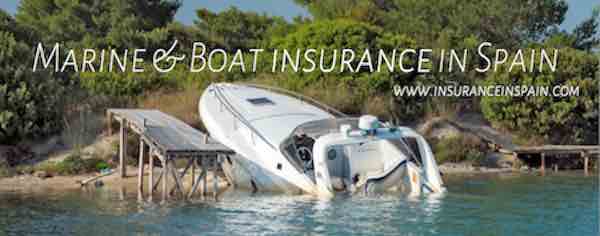
Mon 15 January 2018
Boating in Spain | Boating in Spain
Boating laws in Spain.
If you are just sailing or cruising into Spain and are only going to be in here for less than 183 days of the year then you don’t have any issues to contend with as long as your boat is registered from your country of origin and you are carrying and can provide the original documentation and paperwork when required.
Documents required are:-
1. SSR (Small Ships Register) registration documents if from the UK.
2. Passport.
3. Insurance documents.
4. VHF operators licence
5. Current RYA or ICC certification – your boat operators licence.
You will also be required to ensure that your watercraft, if over 4 meters, complies with all the regulations regarding safety equipment. One lifejacket for every person on board. Flares, A reflective mirror disk, a bell, seems a bit odd but all vessels registered in Spain require a bell to be mounted someone on board. A life saving ring, and a hand bailer.
As a non-residence, some of these rules do not apply, as long as you are compliant with the rules of your country of residence, you should not have any problems. However – the Guardia Civil and Customs authorities can get very awkward if you cannot provide an ICC or some qualification for sailing or driving the boat.
If you are based in Spain or living on your boat for more than 180 days (6 Months) then you will be classified as a residence of Spain and different rules will apply.
To import your boat you will be required to register your boat with one of the local authorities in your region. There are companies specialising in this. WARNING – from personal experience, this can be a very expensive process.
The tax on importing a boat or registering one in your own name, so that it is legal in Spain, is approximately 12% of the value of the boat. If you cannot prove that VAT or IVA as it is known in Spain, has been paid, you may also be hit with an additional 21%.
If your boat does not have a current seaworthiness certificate then you will be required to have a boat inspection and your boat may need to be dry docked or lifted out of the water for this purpose.
When doing this, it is best to ask your Marine importer or the person sorting this out for you for an estimated cost, as this will vary depending upon how you are going to use the boat. Chartering, fishing, family and personal use etc., as costs increase with each activity. If just using your boat as a family day boat, then your registration will incorporate the local area within a few miles of the coast. If you are intending to sail or cruise further afield, or fish further out to sea, outside the 12-mile zone, then a different registration will be applied.
Al the required safety equipment, floatation rings, mirrors, bells, flares, lifejackets, bailer and much more, depending upon the size of your boat, will be required and be within certain date limits, the inspection, the import tax and VAT/IVA charges, can cost a considerable amount. So before you import a boat, look to see if you can find one that is already Spanish registered and just requires the transfer of name for ownership and registration purposes. It will prove cheaper.
Example. A Beneteau 600, a 6 meter family fishing boat with a 90HP outboard motor on board. Already Spanish registered and with a current market value of €12,000, add the cost of buying flares, lifejackets, inspections and transfer fees, including a sea fishing licence and transfer taxes, was well over €2,200. Transfer fees for selling the boat on to another person, was over €1,000 without the trailer being incorporated.
Importing a boat trailer is an absolute nightmare, if you don’t need to don’t even try. Buy one here. If you are bringing one from the UK, put it on a low loader without the trailer. Whatever you do, don’t tow a British registered trailer behind a Spanish registered car. You WILL get it confiscated.
If you are a Spanish resident you are not permitted to have a boat unless it is Spanish registered. This does not apply to small crafts such as dinghies, kayaks etc. that are less than 4 meters long and have an engine under 13 HP. There is some debate here, as it seems to differ from Marina to Marina and with whom you actually deal with.
It is also advisable to include a sea fishing licence, or at least ask about the costs of including it to your boat registration, Sea fishing licences are part of the boat registration although they can be obtained individually for fishing from the shore or a boat. This is a legal requirement in Spain and if you wish to fish in the sea and get caught without a licence, or with illegal fish on board (red Tuna and other tuna species) then you will have ALL of your fishing equipment confiscated and can be fined up to €60,000 Euros.
Guardia Civil and the local customs and Excise boats will and do keep an eye on the Marinas, and when you least expect it they will ask for your paperwork. The marinas will also ask for copies of your passport, registration and insurance documents if you plan to stay in a marina or take a mooring in one.
Two fishermen proudly displayed their catch in the Moraira Marina (near Alicante) recently and were watched and photographed by two undercover officers. They were later charged with illegal fishing and catching and landing an illegal species of fish and were fined over €4,000.
You will see a lot of SSR (British small ships registered) boats in the Marinas, used by residents and non-residents of Spain and rarely is there a problem. Lots of rumours about what can and can’t be done will vary from place to place, and the Marinas will accept foreign registered boats as long as your insurance and documentation are in order. Just remember that the Marinas are duty bound to provide the local Guardia and Customs officials with this information.
www.insuranceinspain.com Tel:- 0034 965275727

